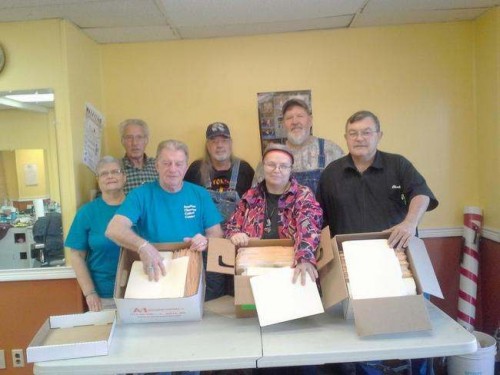After 12 years of research and documentation on their rich cultural heritage, a group of local Southern Cherokee Indians recently mailed three boxes full of paperwork to the Bureau of Indian Affairs in Washington, D.C.

Members of the Southern Cherokee tribe recently mailed the first of two shipments of documentation to the Department of the Interior’s Bureau of Indian Affairs in an effort to be re-recognized as a federal Indian tribe. Front row, from left, are Herman Paul, Darla Matthews and Chuck Wilcox. Back row, from left, are Karen Paul, Bill Tyler, Johnnie Gray and Steve Matthews.
By Eddie O’Neill, The Rolla Daily News
After 12 years of research and documentation on their rich cultural heritage, a group of local Southern Cherokee Indians recently mailed three boxes full of paperwork to the Bureau of Indian Affairs in Washington, D.C.
The boxes were sent off on May 1 in hopes that the tribe will be re-recognized by the United States government.
“We began our research at the Library of Congress,” said Southern Cherokee Chief Steve Matthews. “We visited numerous historical societies, state archives and read books to make sure we got our story right. We also went through three computers in the process.”
The tribe boasts 500 members, the majority of which live in the south central Missouri region. While the group’s headquarters is in Webber Falls, Oklahoma, a branch office is located in Newburg.
“We are kind of a forgotten people,” said Matthews. “We were first recognized by the government with the (Cherokee) Treaty of 1866.”
However, Matthews added, recognition by treaty did not put the tribe on the Federal Register – a directory of government-recognized U.S. Indian tribes.
The review process by the Bureau of Indian Affairs could take two years or as much of 40 years. Federal recognition will allow the local tribe to receive federal benefits which include health insurance and housing. However, Matthews told The Rolla Daily News that even more important would be the ability to pass down the tribe’s heritage to the next generation.
“We got to talking and thought how could we look at our grandchildren and say, ‘We didn’t try?'”
As Matthews and a core group of Southern Cherokees combed through genealogies and other historical records over the last decade, they discovered a lot of history they didn’t know about.
Their name comes from the fact that they fought with the South during the Civil War. After the war, the Cherokee Nation split with some staying on their land in the South, while others moved west of the Mississippi River. The Southern Cherokee eventually ended up settling in Missouri. However, they were not welcomed here.
At the time, Missouri had laws to prevent Indians from moving into or hunting in the state of Missouri without a pass from a government Indian agent. Indians could not purchase or own land in the state. The State Militia was also called out to remove Indians when they were found on white landowners’ property.
It wasn’t until 1924 when tribal Indians could vote.”Our ancestors didn’t talk about our heritage,” recalled Southern Cherokee council speaker Bill Tyler. “We were here illegally—not allowed in the state of Missouri. When we were kids, we were taught not to be seen or heard from strangers because we would be found out.”
Even as the tribe began talking about beginning the process for this federal recognition, there were some in the older generation who were leery or hesitant to “stir up the pot.”
Throughout this process, Matthews explained that local Southern Cherokees have received much support from local officials all the way up to members of Congress.
Southern Cherokee member Chuck Wilcox said that the younger generation has been interested in learning their family history and have been supportive of the application process.The tribe here in Phelps County tries to gather at least once a year.
“It’s like a family reunion,” Wilcox noted.
Over the last few years the tribe has had a float in the Celebration of Nations parade. Wilcox said that has been a good public relations move as locals have learned that there are American Indians right here in their backyard.
“While we want to receive government benefits,” he said, “we also want to have our kids know their family history and to educate the public on who we are.”
